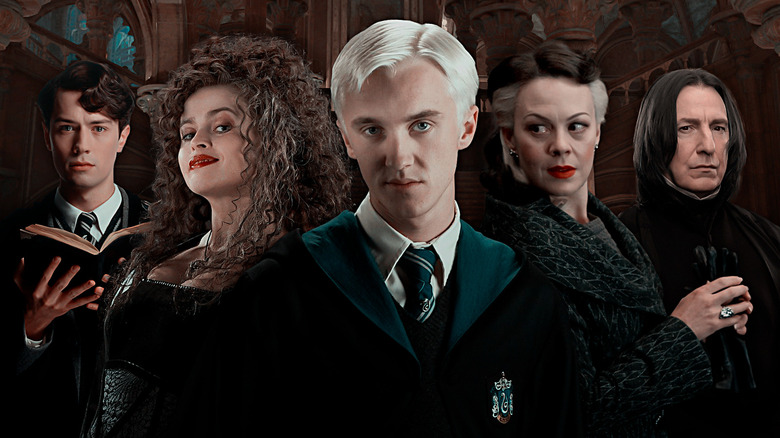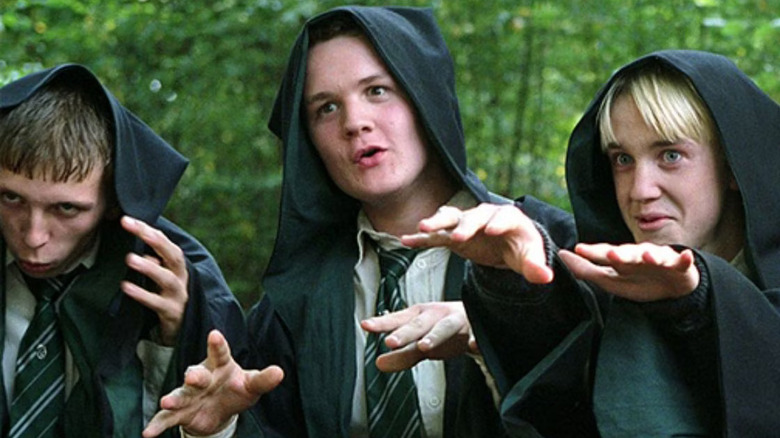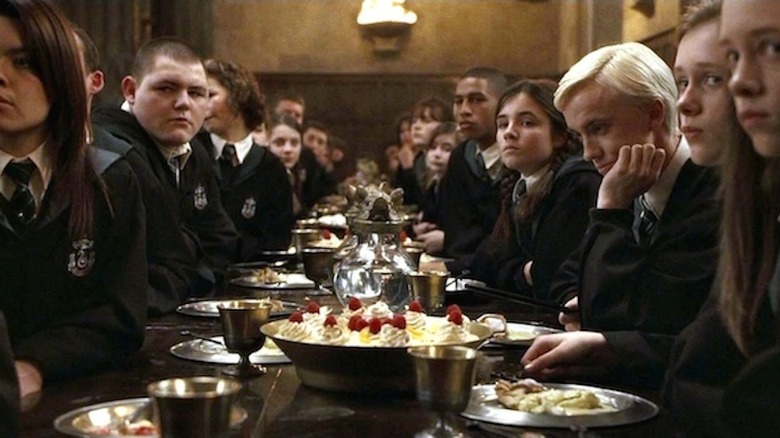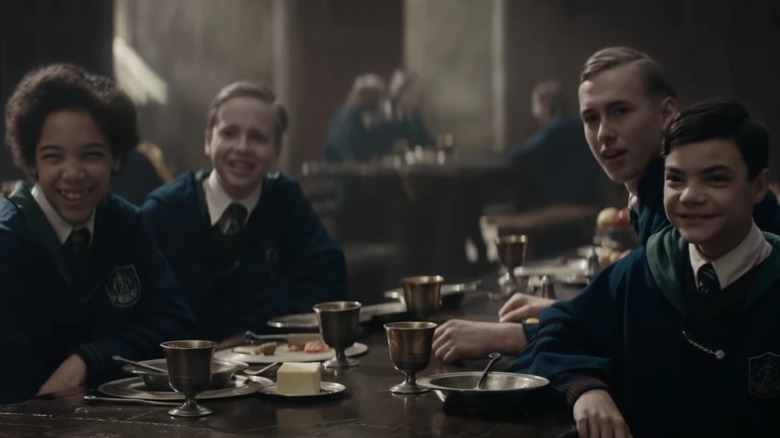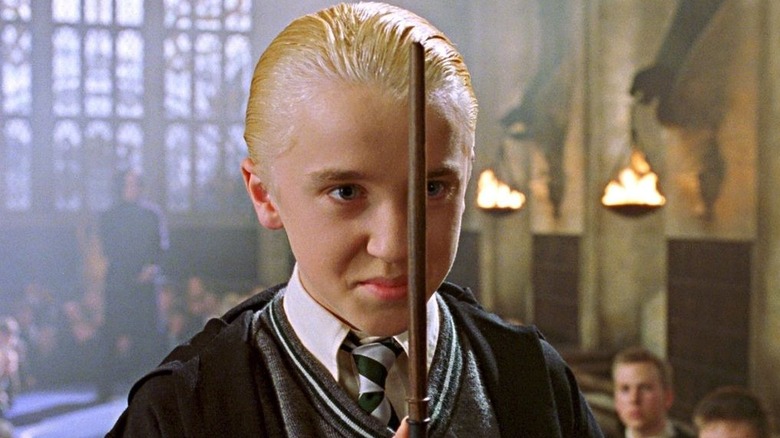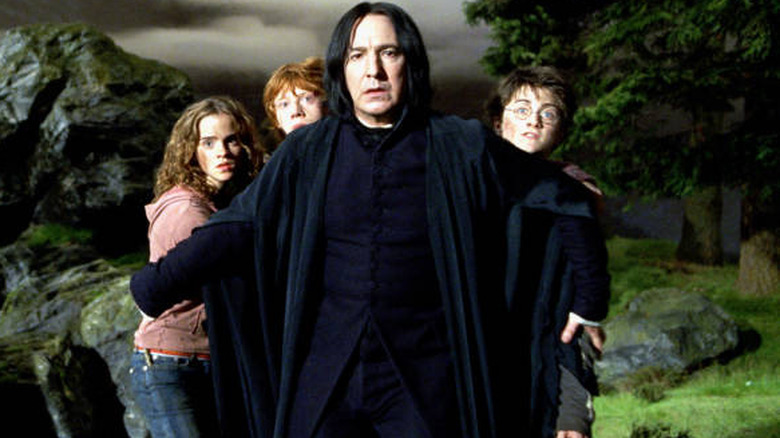The 5 Slytherin Traits You Need Even If You Belong To Another Hogwarts House
Upon arrival at Hogwarts, students in the "Harry Potter" series are Sorted into one of four Houses. Where they end up depends on their innate qualities as judged by the school's magical Sorting Hat: Brave students go to Gryffindor, brilliant ones are placed in Ravenclaw, hard workers head to Hufflepuff, and cunning kids go to Slytherin. This doesn't seem terrible at first, but it's not an understatement to say that Slytherins have a bad reputation. Slytherin is, for lack of a better term, the "evil" House.
Before he even gets to school, Harry (Daniel Radcliffe) learns that the Dark Lord Voldemort (Ralph Fiennes) was Sorted into Slytherin, and he also runs into Draco Malfoy (Tom Felton), a snide boy who displays obvious disdain for anyone who isn't from a pure-blood magical family. Once Harry is officially Sorted into Gryffindor and Draco into Slytherin, the rivalry between the two Houses becomes crystal clear, and for the remainder of the series, Slytherins are largely depicted as sneering villains without a whole lot of wiggle room (with some exceptions, but not that many).
So is there anything positive about Slytherin House? Definitely! Slytherins are cunning, but they're also smart, ambitious, ahead of the game, and able to withstand even the most dire of circumstances. Here are some Slytherin-coded traits that could help absolutely any Hogwarts student succeed.
Slytherins are cunning — and that's a helpful trait
At Harry's Sorting Ceremony in "Harry Potter and the Sorcerer's Stone," the Sorting Hat describes Slytherin students using the word "cunning," crooning, "Or perhaps in Slytherin / You'll make your real friends, / Those cunning folk use any means / To achieve their ends." The hat returns to this theme in "Harry Potter and the Order of the Phoenix," and though it makes sure to highlight dangerous divisions between Houses, it still specifies that each founder preferred particular students: "For instance, Slytherin / Took only pure-blood wizards / Of great cunning, just like him."
Being cunning might mean being dishonest from time to time, but it could also be interpreted as simply playing one's cards close to the vest. While Draco always seems to be plotting something, that's not what makes him a villain for most of the series; his terrible attitude and hatred of anyone he deems inferior are his real bad qualities. Plus, Hogwarts students have to be pretty cunning just to get through their classes, to say nothing of the constant dangers that lurk within the school's halls. Hogwarts can be a tricky place to be a kid; a little cunning wouldn't hurt anyone, whether they're Ravenclaw, Hufflepuff, Gryffindor, or Slytherin.
Cleverness is a cornerstone of Slytherin House
Ravenclaws might be known for their intelligence and cleverness, but Slytherins are certainly characterized as clever too. Look no further than famous Slytherin Severus Snape — played on-screen by the late, great Alan Rickman — whose Potions textbook was full of brilliant recipe innovations and handcrafted spells that actually work. Let's also be fair and acknowledge that while some of Draco Malfoy's friends might be sort of dimwitted, Draco isn't dumb and performs reasonably well in his classes as far as audiences know — he's just overshadowed by Hermione Granger (Emma Watson), who happens to be the smartest witch in the entire school.
From Snape to Draco to Slughorn (Jim Broadbent) to Voldemort himself — "After all, He-Who-Must-Not-Be-Named did great things — terrible, yes, but great." — there's a clear throughline that Slytherins are quite smart, even if Ravenclaws get all the glory in that department. Hogwarts is nothing if not academically rigorous, with students taking exams in both their fifth and seventh years that really put their skills to the test. Whether they're Transfiguring mice into teacups, casting complicated charms, or brewing difficult potions, Hogwarts students have to be clever, and the best and brightest Slytherins certainly are.
Slytherins are ambitious go-getters
Ambition, as a quality, is a double-edged sword. One could call Harry or Dumbledore (Michael Gambon) ambitious in that they strive to achieve their goals, but one could also call Voldemort ambitious for that very same reason. In any case, there's no denying that Slytherins are extremely ambitious and will stop at nothing to be high achievers. This is also noted in the song the Sorting Hat sings in "Harry Potter and the Goblet of Fire," where it once again describes the type of students handpicked by each founder: "Power-hungry Slytherin / Loved those of great ambition."
Right at the beginning of "Sorcerer's Stone," when Harry and the other new students learn about the House Cup — an award given to the House that earns the most points throughout the year — it's specifically noted that Slytherin has been on a winning streak, which ultimately ends when Harry and his friends perform the small task of saving the school from Voldemort's clutches. Still, it seems like the competition comes down to Slytherin and Gryffindor duking it out for the title every single year, and Gryffindor has to win for plot reasons ... so it's undeniable that ambition is a quality that would benefit students in every Hogwarts House, particularly as it pertains to the House Cup.
If you're a Slytherin, you're probably a step ahead of most of your peers
If Voldemort is the Big Bad of the "Harry Potter" franchise, Draco Malfoy is perhaps its most prominent and consistent "Small Bad," to use the same parlance. Draco is a thorn in Harry's side right from the beginning of their time at Hogwarts, whether the privileged young Slytherin is challenging him to an illicit midnight duel or impersonating Dementors to try to make him faint during a Quidditch match. Unlike the bumbling, ineffectual villains from other series, though, Draco is pretty smart, which is perhaps best displayed in "Harry Potter and the Half-Blood Prince" — in which he very nearly carries out a complicated assassination attempt that spans an entire school year while evading Harry at just about every turn (despite intense efforts by the Boy Who Lived).
Although Harry knows Draco is up to something even before the school year begins, he can't figure out exactly what it is, showing that Draco is always one step ahead of his Gryffindor nemesis. Whether he's making his sidekicks take Polyjuice Potion to masquerade as young girls or utilizing the Room of Requirement — a room previously used by Harry and his vigilante group, Dumbledore's Army — Draco outsmarts Harry at just about every turn, and though he's ultimately unable to kill Dumbledore himself, the scheme is darkly impressive. Let's be clear: No Hogwarts student should be planning elaborate murder plots. That said, being a few steps ahead of your enemies is never a bad thing, especially if you're working toward the greater good in some way.
Above all, Slytherins persevere
Slytherins contain multitudes, but above all, they're a study in perseverance — or at least, the House's standouts are. Let's turn to Snape once again, who is revealed to be one of the franchise's most complex characters after he's killed by Voldemort and bequeaths his memories to Harry during his final moments of life. It's then that Harry learns Snape, who seems like his antagonist for the bulk of the narrative, has actually been protecting him the entire time due to his love for Harry's mother, Lily, and undying loyalty to Dumbledore.
Yes, Snape is killed during the denouement of "Harry Potter and the Deathly Hallows," but his perseverance is pretty incredible throughout the series as he manages to fool every person but Dumbledore into thinking he's the Dark Lord's most loyal footsoldier. His ability to withstand the most dangerous situations and the most difficult of circumstances shouldn't be overlooked, and whether someone is a Gryffindor, a Ravenclaw, or a Hufflepuff, bravely standing in the face of frightening adversity is a pretty positive quality.
